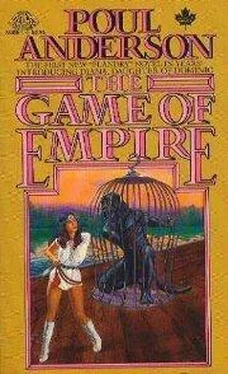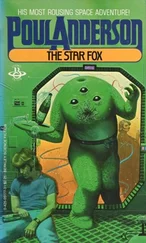Poul Anderson - The Game of Empire
Здесь есть возможность читать онлайн «Poul Anderson - The Game of Empire» весь текст электронной книги совершенно бесплатно (целиком полную версию без сокращений). В некоторых случаях можно слушать аудио, скачать через торрент в формате fb2 и присутствует краткое содержание. Год выпуска: 1985, ISBN: 1985, Издательство: Baen Books, Жанр: Космическая фантастика, на английском языке. Описание произведения, (предисловие) а так же отзывы посетителей доступны на портале библиотеки ЛибКат.
- Название:The Game of Empire
- Автор:
- Издательство:Baen Books
- Жанр:
- Год:1985
- ISBN:978-0-671-55959-5
- Рейтинг книги:4 / 5. Голосов: 1
-
Избранное:Добавить в избранное
- Отзывы:
-
Ваша оценка:
- 80
- 1
- 2
- 3
- 4
- 5
The Game of Empire: краткое содержание, описание и аннотация
Предлагаем к чтению аннотацию, описание, краткое содержание или предисловие (зависит от того, что написал сам автор книги «The Game of Empire»). Если вы не нашли необходимую информацию о книге — напишите в комментариях, мы постараемся отыскать её.
The Game of Empire — читать онлайн бесплатно полную книгу (весь текст) целиком
Ниже представлен текст книги, разбитый по страницам. Система сохранения места последней прочитанной страницы, позволяет с удобством читать онлайн бесплатно книгу «The Game of Empire», без необходимости каждый раз заново искать на чём Вы остановились. Поставьте закладку, и сможете в любой момент перейти на страницу, на которой закончили чтение.
Интервал:
Закладка:
That was all. Talk had slipped elsewhere. She found herself yearning to know what he meant. Had she the right to abet spying on him, to violate his hospitality and trust? But she had given Targovi her promise, Targovi her brotherling, the son of Dragoika who had been like a mother to her after Maria her blood-mother died—and if he found no evidence of wrongdoing, what harm would she have done?
How could she say? How dared she say?
Kukulkan’s glass clinked against hers. “Happy morrows,” he toasted. She smiled back and tossed off a longer draught than was sophisticated. Tartness danced down her throat, bubbles tickled her nostrils. Presently she felt almost at ease—aware, without any belligerence, of the muscles beneath her skin and the Tigery knife at her belt. She hoped that whatever happened would indeed be happy; but whatever it turned out to be, surely an adventure awaited her.
Nacre Bay was a broad half-circle cut into the north coast. The Mencius Hills formed an inner arc, with a narrow flatland between them and the water. Through them flowed the Averroes River, glacier-fed by the Hellas Mountains farther south. Janua occupied the shore and the slopes behind.
It was not a town. Kukulkan had explained that Zacharia bore none. Most buildings stood by themselves, usually rather far apart. Aircars and telecommunications linked them as well as if they formed a village. However, it was most practical to have certain things close together—the small spaceport, a large airfield, a harbor for surface vessels, associated facilities—and in the course of time various industries and institutions had naturally located in the same area—which meant more homes and service enterprises—The region of relatively concentrated population got the name Janua. By ordinary standards it was dispersed enough, sprawling without official boundaries across more than two hundred square kilometers. As their pilot brought the cruiser down, Diana saw the same blend of forest and housing as at Lulach.
No, she realized, not the same at all. The hills were landscaped into terraces, ridgeways, contoured hollows, graceful sweeps of greensward. Gardens abounded. Trees grew orderly along roads or in bowers or groves. Some of the latter were quite large, but had clearly been planted and tended. They, like vegetation everywhere, were Terran, as near as she could judge. That was not very near, when she knew the life of the mother planet mostly from pictures, but Kukulkan had told her that the original settlers eradicated everything native and reshaped their new home according to their will.
Such houses as she glimpsed were unique in her experience. They seemed to be of stone or a stonelike synthetic, rectangular in plan, peak-roofed, fronted or surrounded by porticos, their colors subdued when not plain white. Even the large utilitarian structures down close to the shore followed that general style. She thought it was pretty—doubtless gorgeous when you got a close look—but already wondered if it might not prove monotonous. A frowning, rough-walled compound on the heights was well-nigh a relief to her eyes.
The spaceport was probably a standard model. She couldn’t be certain, because she got only the most fleeting sight of it during approach. It was on the untenanted southern slope of the range, opposite the fortress-like place, as if to keep such inelegance from intruding on vision. The airfield, on the eastern rim of the bay, was screened by tall hedges below which ran flowerbeds.
They landed. Passengers unsnapped their harnesses and rose from their seats. “Welcome to Zacharia,” said Kukulkan gravely, and offered Diana his arm. She didn’t recognize the gesture. He chuckled and, his free hand taking hers, demonstrated what he had in mind. A delicious shiver went through her.
“Tomorrow we’ll start showing you about,” he said.
Axor cleared his throat, somewhat like a volcano. “We should not unduly impose on your generosity,” he boomed. “If I may meet the appropriate persons and make use of the appropriate materials—”
“You shall, you shall,” Kukulkan promised. “But first we must get you settled into your quarters, and let you rest after your journey.”
The flight had been neither long nor taxing. Nevertheless Diana confessed a degree of weariness to herself. So incredibly much excitement!
Kukulkan escorted her into the terminal. A wall displayed a mural which puzzled her. It depicted a male and female human, nude, of the variant she had heard called “Mongoloid,” emerging from clouds wherein drifted hints of stars, like a galaxy a-borning. “An ancestral creation myth,” the man told her. “To us it symbolizes—Ah, but here is the greeting committee.”
Almost the only folk present at this hour, they were four and, like the pilot, not as precisely similar in appearance as Kukulkan and Pele were, to that pair or to one another. While the gene pool in the population was fixed, homozygosity for every desired trait—including some that were not sex-linked—had proven to be a biological impossibility. Discrete combinations appeared in each generation; if you counted the slightest of the changes that were rung, they were manyfold. Yet the “family” resemblance overrode any minor variations in height, coloring, cast of features. Sex and age and the marks left by life were the principal differences between Zacharians. These were all older than the new arrivals, and, over and above the basic pridefulness of their breed, bore an air of distinction.
Their garb was what Diana would learn was formal: sandals on the feet, wreaths on the brows, the two men in tunics and the two women in flowing but constraining wraparound gowns, white with colored borders. Their names were foreign to her, Vishnu and Heimdal male, Kwan Yin and Isis female. The latter woman took the word, her gaze on Axor: “Welcome. It is an honor and will be a pleasure to receive an outstanding scholar. I shall be your introducer to the Apollonium, since I am the one among us most familiar with the subject in which we hear you are interested. But my colleagues in general anticipate learning much from you.”
“Ochla, I came to, to beg knowledge of you,” the Wodenite faltered. “Although—no, I will not discuss religion more than is necessary, unless you desire, but the exchange of … ideas, information;—” An earthquake quiver of avidity went through him from snout to tailtip. His dorsal plates moved like a saw, the light rippled off his scales.
Heimdal said to Targovi, on a note of polite skepticism: “Being in offplanet trade, I am willing to discuss possibilities with you. I cannot encourage optimism. The local market for Imhotepan curiosities was saturated long ago.”
“We can at least talk,” the Tigery replied, “and then mayhap I can, by your leave, look about this neighborhood. Something may occur to me, whereby we can both profit.” Diana could sense the watchfulness beneath his affability.
“Come,” Kukulkan murmured in her ear. “If you have no set purpose of your own among us, I’ll be delighted to be your dragoman—provided I can fend off my envious brethren.”
“Don’t you have work to do?” she asked, anxious not to overreach her self.
He shrugged and smiled. “My work is somewhat special, and at present I am, shall we say, on standby.”
They went from the terminal. After the heat and damp of the valley, sea breezes were a benediction. A flatbed vehicle waited for Axor, in which Isis joined him; the rest got into a ground limo. Diana was aware of a boulevard flanked by trees and abstract sculpture, of windows aglow, of other cars but not many, of pedestrians and occasional horseback riders—handsome, physically perfect, eerily alike—The ride ended at a house which stood on what appeared to be a campus, to gauge by lawns, trees, and larger neighbor buildings.
Читать дальшеИнтервал:
Закладка:
Похожие книги на «The Game of Empire»
Представляем Вашему вниманию похожие книги на «The Game of Empire» списком для выбора. Мы отобрали схожую по названию и смыслу литературу в надежде предоставить читателям больше вариантов отыскать новые, интересные, ещё непрочитанные произведения.
Обсуждение, отзывы о книге «The Game of Empire» и просто собственные мнения читателей. Оставьте ваши комментарии, напишите, что Вы думаете о произведении, его смысле или главных героях. Укажите что конкретно понравилось, а что нет, и почему Вы так считаете.











